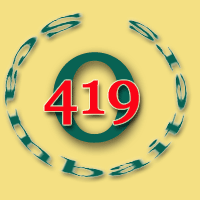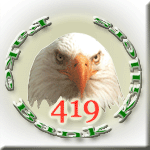
• Home •
Victim´s Story •
Fraud Prevention •
Project GSO •
Hall of Shame •
LINKS •

What is Counterfeit Check Fraud?
Alert information - Counterfeit check scams
If you have received an Official Check or Cashiers Check for the sale of your vehicle there are some things you should look for to help prevent you from being the victim of negotiating a fraudulent Bank check.
Counterfeit Checks are probably the easiest to create, but may be a little harder to detect with today’s technology. A counterfeit check may be a copy of a genuine check, copied on a printer or copy machines. A counterfeit check may also be an actual check, printed with a home computer and software program, using someone else’s information.
Things to look for Counterfeit Checks:
• Misspelled words on the face of the check
• Borders on the check appear uneven
• Magnetic number line is uneven/printed too low or too high on the bottom of the check
• No Bank logo or Corporate logo, or if there is, it does not appear to be crisp and clear
• The check # in the upper right hand corner does not match the check # in the magnetic line on the bottom of the check
• Look at the City or State where the check was issued from, is that the location where you are sending your vehicle or where the purchaser said they live
• Blurry or fuzzy printing. Good checks are clear. If blurry, then it could indicate that it has been photo copied or scanned.
• Raised numbers or letters. Check should be smooth.
• Always verify the check before depositing it to your account. Do not call the telephone number on the face of the check,
if one is provided, use an independent source to obtain the telephone number, such as the yellow pages or Directory Assistance. There are also online verification of telephone numbers searches such as “Reverse Lookup”.
Things to look for Altered Checks:
• As with counterfeit checks, each of the items listed above can be said of a Altered check but you should also look at the PAYEE line of the check
• Does there appear to be any type of erasure, or white out on the payee line. If unsure, hold the check up to the light, usually erasures or white out can be detected this way.
• Look at the dollar amount of the check, here again you are looking for changes in the amount.
The difference between an altered check vrs. a counterfeit check is that an altered check is usually a legitimate check that has been issued from the financial institution listed on the face of the item, however, it was not issued to the payee or for the dollar amount that you are seeing. When you contact the financial institution that the check is drawn on you should be asking the following:
• Are the any stops or holds on this check #
• What is the payee name on the face of the check
• Has it been reported lost
• Do your records show the check was issued for this dollar amount
Spacing should always be consistent thought the check so examine it carefully. The type should all be of the same height, color and size, if not, you should be suspicious. Official Bank Checks or Cashiers Checks are rarely ever handwritten.
Your Protection:
After reviewing the above if you are still not certain, take the check to your financial institution. Do not deposit the check into your account, ask your Bank to send the item “for collection”. Your account will be credited only when the funds are received by the financial institution that the check is drawn on.Wire Transactions:
Are wire transactions any safer? That really depends on the circumstances. If you are selling a vehicle and the buyer offers to send you money via wire you are going to have to provide that person with your bank routing number and account number, they already have your name and most likely your address. Make sure that you have made a positive identification on the individual before considering a wire transfer. Talk to your banker about how money should be transfered and what precautions should be taken.
Should your account or identity be compromised you should contact the following credit reporting agencies immediately:
Equifax – 800-525-6282 or www.equifax.com
Experian – 888-397-3742 or www.experian.com
TransUnion – 800-680-7289 or www.transunion.com
For additional information regarding Identity Theft you may also go to The Federal Trade Commission’s Identity Theft Wed Site www.consumer.gov/idtheft
Also, you may want to contact the FBI or Secret Service to report any fraud attempts
Remember the following:
* A true buyer is not going to send you a check or wire for more money than the agreed selling price, does that even sound right to you? BEWARE: IF SOMETHING IS TO GOOD TO BE TRUE, IT USUALLLY IS.
* Your Bank will pursue recovery from you by any and all legal measures available to them in the collection of this debt.
There are dozens of Internet Sites that can provide you with information regarding scams and frauds. Just type in Internet Scams and see what pots up!
Counterfeiters switch to cashier's checks
Cashier's checks have always had a reputation for being as good as cash, but that's not a sure thing anymore. The reputation has gotten tarnished as more and more counterfeiters opt to phony-up cashier's checks and pass them off to folks like you.
"People are getting sophisticated with PCs and scanners. We're going to be seeing a lot more of this," says Marty Ramage, fraud expert with The People's Bank & Trust Company of Tupelo, Miss.
Ramage says one of his bank's cashier's checks was counterfeited a few weeks ago.
The way it works is the counterfeiter comes into the bank, gets a legitimate cashier's check and then uses a scanner to copy it on to a computer. With the help of some printing software, the counterfeit can be doctored -- payable to anyone, for any amount.
"It's put a bind on our bank on accepting cashier's checks," Ramage says. "In the past we would have taken a cashier's check from any bank across the nation without question. All banks have been accustomed to treating cashier's checks as cash. Not anymore. Everyone has to take some safeguards."
The FDIC is receiving reports of several fake cashier's checks each month.
"Some are complete phonies -- the bank name is phony, the city is misspelled. But some are identical copies, and it's really difficult to tell they're fake," according to Gene Seitz of the FDIC's special activity section.
Seitz says very few of the counterfeit cashier's checks are being cashed at banks; they're being used to pay individuals and merchants.
Seitz advises everyone who receives a cashier's check as payment to call the issuing bank and make sure it authorized that check.
That means consumers should think twice before accepting a cashier's check no matter how real it looks. If someone tries to give you a $2,000 cashier's check for your used car, or a $30 cashier's check for something you're selling on Ebay, don't accept the payment until the issuing bank has verified it.
Clues to spot Counterfeit check scams
Counterfeit check scams slamming St. Louis; clues to spot fakes
(KMOV) - A new type of sophisticated counterfeit scheme is hitting the St. Louis area.
Crooks are using fake cashier's checks to try to steal your money, but there are ways to spot the fakes.
It’s hard to tell the difference between counterfeit checks and real ones, but at Liberty Bank in Alton they have been trained to know the difference.
Tellers were recently trained by a federal agent.
President of Liberty Bank, Dale Blachford leads the Illinois Bankers Association Check Scam Task Force.
Blachford says, "In fact there's probably more cashier's checks that are counterfeited than currency at the present time, at least we see that more.”
Crooks often use bogus checks for online purchases.
Postal inspector Dan Taylor says, "The scams boil down to trying to trick a victim into cashing a bad check, and then wiring the money off or sometimes sending it through an overnight service."
If there's any question about the check, deposit it and wait at least a month. If you endorse it and it turns out to be counterfeit, you're liable for the amount. You have to pay that back to the bank. It's just like somebody robbed you without using a gun.
Liberty Bank has put a display in the lobby to educate customers.
Blachford says, "This number up here is the check number that should always be the same as this number down here on this micro line and if they don't match it's a counterfeit."
The scams are usually from a foreign country, and the letters with them have misspellings and a sense of urgency.
CLUES TO COUNTERFEIT CHECK SCAMS
-Check number doesn’t match number on lower left of check
-Sent from a foreign country
-Overpayment
-Request to wire or overnight money
-Urgency to send money
-Accompanying letter asks money be sent in “US Dollars”
-Check address doesn’t match accompanying letter
-Misspellings on check or in letter
-Blurry watermark
-Name on check and bank it’s drawn from, in different cities
© by GSO • Contact